| Srl | Item |
| 1 |
ID:
139595
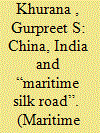

|
|
|
|
|
| Summary/Abstract |
In the coming years, the texture of China–India relations will be a crucial determinant of the geopolitical, economic and security environment of Asia, with a strong impact on the global order. Both countries have lately emerged as major economies. This has led to a dilation of their areas of maritime interest, and thereby a growing China–India interface at sea. This may be accompanied by both opportunities and challenges. Given the dynamism of recent developments, these need to be continually assessed and appraised as inputs for policy making. Among the most significant developments is China's “Maritime Silk Road” (MSR) initiative. In context of this development, this paper attempts to examine the convergences and divergences between China and India. While the bilateral divergences may continue to persist, the paper attempts to assess whether the two countries could capitalize upon the convergences to seize the opportunities presented by the MSR.
|
|
|
|
|
|
|
|
|
|
|
|
|
|
|
|
| 2 |
ID:
139314
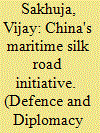

|
|
|
| 3 |
ID:
143686
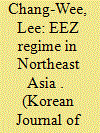

|
|
|
|
|
| Summary/Abstract |
One of the most controversial issues during the UN Conference on the Law of the
Sea was to determine the legal status of the EEZ. The first view envisaged the
zone as an extension of the territorial sea, where the coastal states would enjoy
sovereignty with certain exceptions. The second view considered the zone to have
the high seas status with certain modifications. The third view held that the EEZ
was a sui generis zone with its own legal status. The first view was presented
by several Latin American states. The second view reflected the concerns of
Maritime Powers.
|
|
|
|
|
|
|
|
|
|
|
|
|
|
|
|
| 4 |
ID:
139048
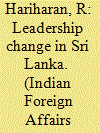

|
|
|
|
|
| Summary/Abstract |
At the strategic security level, apart from Sri Lanka’s bid to renew relations with India, China’s concerns with the Sirisena government relate to its ambitious power projection in South Asia and the Indian Ocean Region (IOR). Sri Lanka has emerged as a key strategic pivot astride the Indian Ocean to further China’s 21st Century Maritime Silk Route (MSR). Sri Lanka has already announced its support to the initiative. China has recently announced an outlay of US$ 40 billion for the MSR. With this huge investment, and those already made in port and road infrastructure projects in Sri Lanka and Pakistan, China simply cannot afford any obstruction to the completion of MSR, which would increase its strategic reach in keeping with its global ambitions. China has tried to use its existing discounted but firm relationship with Sri Lanka by turning President Sirisena’s desire to rebalance Sri Lanka’s relations with India as an opportunity for evolving a triangular relationship with India and Sri Lanka. This would help China further its strategic objectives in IOR and South Asia, as well as bring in India to join the MSR and turn it into a successful project.
|
|
|
|
|
|
|
|
|
|
|
|
|
|
|
|
| 5 |
ID:
147979
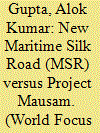

|
|
|
|
|
| Summary/Abstract |
Alfred Thayer Mahan in his book The Influence of Sea Power upon History 1660-1783 most famously presented his concept of ‘sea power’ which was based on the idea that countries with greater naval power will have greater worldwide impact. His concept had an enormous influence in shaping the strategic thought of navies across the world, especially those of United States, Germany, Japan and Great Britain. His concept ultimately led to European naval arms race in the 1890s. It was indeed a revolutionary analysis of the importance of naval power as a factor in the rise of the British Empire. Mahan’s argument that British control over the seas, combined with a corresponding decline in the naval strength of its major European rivals paved the way for Great Britain’s emergence as the world’s dominant military, political and economic power.
|
|
|
|
|
|
|
|
|
|
|
|
|
|
|
|
| 6 |
ID:
169343
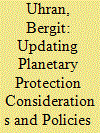

|
|
|
|
|
| Summary/Abstract |
Planetary protection, or the protection of celestial bodies from potentially harmful contamination, has been required by international law since the ratification of the Treaty on Principles Governing the Activities of States in the Exploration and Use of Outer Space in 1967. At that time, scientists were concerned about the potential of contaminating the Moon or bringing back a life form of lunar origin when astronauts returned to Earth with samples. The evidence is that the Moon does not contain indigenous life, but other celestial bodies may. Mars is of particular concern because of its habitability and plans to carry out a robotic sample return mission and even potentially human crewed missions in the near future (next 20–30 years). This article (recognizing that other national and international tasks are ongoing with detailed studies of technical aspects of containment and sample analysis) provides an overview of the policy aspects of planetary protection and sample return, discussing the history of planetary protection, lessons learned from the Apollo missions, and a potential strategy to ensure prevention contamination if a robotic sample return mission is carried out. It is recommended that the capability performed in the 1960s by the Interagency Committee on Back Contamination be reestablished, that regulations be developed to allow quarantine of anyone exposed to the samples, that scientific and technical personnel be trained in a receiving laboratory for at least 2 years prior to sample return, and that a test protocol be established for examining the samples. This will protect our biosphere while enabling groundbreaking research into conditions on Mars and any possible signs of life.
|
|
|
|
|
|
|
|
|
|
|
|
|
|
|
|